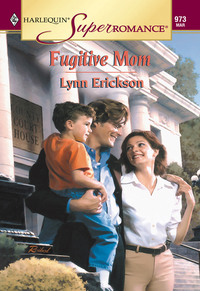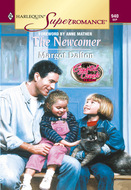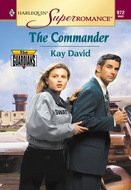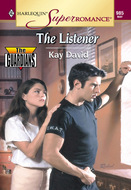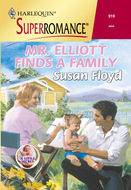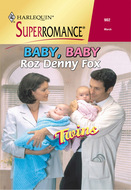This book cannot be downloaded as a file but can be read in our app or online on the website.
Read the book: «Fugitive Mom»
“Grace, I’m still mad,” Luke said. “I only hope you won’t pull another stunt like that.”
She heard him take a deep breath.
“Right now you can tell the FBI you had a breakdown and lost touch with reality, and that’s why you took off with the boy. I know that’s bull, but at least the law would have to consider it. But if the feds get wind that you were out trying to destroy his birth mother’s credibility, you can kiss the nervous breakdown story goodbye. They’ll throw the book at you. For the time being you’re the innocent victim in the public’s view. You don’t want to fall from…grace,” he said, “If you’ll forgive the pun.”
“That isn’t funny,” she said with a catch in her voice.
He frowned. “I can’t take it when a woman cries.”
“I’m not crying.”
“It’s okay. You tried to help. I overreacted. Come on, Grace.”
She let him enfold her in his arms, and suddenly nothing mattered. There was only Luke and pure sensation flowing through her veins. She tried to focus on the hurt he’d caused her, on how close they were to their goal. Her little boy…soon, soon, her little boy would be safely back with her.
But at the moment there was only Luke and her hopeless, spiraling need….
Dear Reader,
We first learned about a situation identical to the one in Fugitive Mom from an article in a newsmagazine. However, in real life the story had an unhappy ending when the foster parent was required by the courts to return her baby to the biological mother. A year later, one of our close friends underwent a similar ordeal, and our hearts were touched.
This is why we write books—we can solve these thorny problems and create happy endings. But we certainly do enjoy putting our protagonists through the wringer on the route to success. And wouldn’t it be wonderful if the heroine fell in love on her journey?
We hope you enjoy Fugitive Mom, and please visit us on the Harlequin Web site.
Best wishes,
Carla and Molly
(Lynn Erickson)
Fugitive Mom
Lynn Erickson
CONTENTS
CHAPTER ONE
CHAPTER TWO
CHAPTER THREE
CHAPTER FOUR
CHAPTER FIVE
CHAPTER SIX
CHAPTER SEVEN
CHAPTER EIGHT
CHAPTER NINE
CHAPTER TEN
CHAPTER ELEVEN
CHAPTER TWELVE
CHAPTER THIRTEEN
CHAPTER FOURTEEN
CHAPTER FIFTEEN
CHAPTER SIXTEEN
CHAPTER SEVENTEEN
CHAPTER EIGHTEEN
CHAPTER ONE
COURTROOM C OF THE Boulder County Justice Center looked just like the other courtrooms in the sprawling building: blond wood, industrial blue carpet, judge’s podium, jury box and spectators’ benches in a kind of faux Danish modern style. But to Grace Bennett, sitting at a prosecution table in front, Courtroom C was the worst hell on earth.
“‘In the case of minor Charles L. Pope, he is remanded to the permanent custody of his biological mother, Kerry Ann Pope,’” the Juvenile magistrate intoned, reading his decision. “‘He is to be removed from the care of his foster mother, Sally Grace Bennett, in four days’ time. The State of Colorado and the County of Boulder thank you, Ms. Bennett.”’ His gavel thudded dully on its block.
Grace heard the young woman at the other table say something: “Oh, wow! Thank you, Your Honor.”
The words were spoken by Kerry Pope, in her early twenties, thin and pale, wearing worn jeans and a sweatshirt that said CU, out of prison six months ago, out of her halfway house only two months ago. Rehabilitated, according to the legal system. Charley’s biological mother. A joke! It must all be a stupendous joke, a bad dream. Kerry had never taken care of Charley. Never!
Grace put her head in her hands, elbows leaning on the blond wood table. She fought tears, felt desperation fill her to the brim and spill over.
The clerk of the court scribbled busily; the court stenographer tapped the judge’s last words into her machine. There was no jury to comment upon the decision, to murmur or gasp, but there were onlookers, mumbling in a monotone behind Grace, probably talking about their own cases, not hearing or knowing or caring….
No, Grace wanted to scream. You can’t do this. Charley, handed back to his so-called mother. Her Charley, whom she had cared for since he was three months old. Her son, for God’s sake.
“Grace,” her lawyer was saying, “come on, Grace, we have to go.”
She raised her face up to the woman who’d represented her at this hearing. “They can’t do this, Natalie. They can’t just—”
Natalie Woodruff took Grace’s arm gently. “We have to leave. The judge has ruled.”
“But can’t you…can’t we appeal this? There must be something we can do.”
Natalie’s eyes were full of sympathy—not that it would do Grace or Charley any good. “Not now, Grace. It’s over. We have to go.”
Slowly, Grace stood up. Her knees felt weak, her stomach knotted. Her heart pounded sickeningly in her ears. Charley, Charley. Automatically, she reached for her handbag and stepped away from the table. She glanced at the Juvenile judge again; he was reading a file the clerk had handed him, peering at it over half glasses. He’d already forgotten Grace and Charley—he was dealing with another case. Oh, God.
“Grace,” Natalie said again.
She moved shakily toward the double doors at the back of the courtroom, following Natalie. She prayed Kerry Pope wouldn’t say anything to her.
Natalie was pushing the first set of doors open; they closed behind Grace with a whoosh, then the second set opened and the world rushed back—the crowded corridor of the Justice Center, the front entrance not far away, summer sun spilling through, the security guards on duty.
“Come on, Grace, let’s get out of here,” Natalie was saying, but Grace felt so weak for a moment she slid down onto one of the long benches against the stark white wall.
“Ms. Bennett,” she heard, and looked up. A young woman was standing in front of her. Vaguely familiar. A little heavy, a worried frown between her eyebrows. Wearing a rumpled gray suit that showed her dimpled knees.
“Yes?” Grace said faintly.
“My name is Susan Moore. I’m with Child Protective Services. I…I know about you. I heard the decision.”
Grace adjusted her glasses and gazed at Susan Moore.
“I’m sorry,” Susan said. “I’m so so sorry.”
“Thank you,” Grace whispered.
“Here,” Susan said, pushing something into Grace’s hand. A scrap of paper.
Grace stared at her hand stupidly. “What is this?” she asked.
“Help,” Susan said. “A phone number. Call it.”
Grace raised her eyes. “I…” But Susan was walking away through the crowd.
“Who was that?” Natalie asked.
“Oh, an acquaintance. Telling me how sorry she was.” Instinctively, Grace lied. She had to think, go home and pay the baby-sitter and hug Charley and think. What did Susan Moore mean? Help. What kind of help? Who…?
“Do you want me to drive you back?” Natalie was asking.
“No, no, I’m okay. Honestly. I’ll make it.” Grace tried to smile.
“Sure?”
“Yes, I’m sure. Thanks, Natalie. I know you did your best.”
“I’m afraid,” her lawyer said, “the courts are prejudiced in favor of the biological parents these days. We knew that going in.”
“Even when the parents are drug addicts or abusive…yes, I know. You warned me.”
“We made a good try,” Natalie said, squeezing Grace’s hand.
“Not good enough,” Grace said sadly.
“I’ll file an appeal,” Natalie said.
“Yes, an appeal.”
“We can try again. If Kerry does something outrageous, if she puts Charley in danger, well, we can bring it to the court’s attention. The judge might review his ruling in that case.” Her voice held little conviction.
Grace stopped short and put her hand on Natalie’s arm. “She will, you know. She’ll do something terrible. You know it and I know it and the judge should have known it. Think of Kerry’s history. Drugs, rehab, more drugs. You think she’s really rehabilitated? For God’s sake, Natalie, she’s going to slip again. She was abused as a child, and you know what that means. You know…” Her voice clicked off.
“Take it easy, Grace. Social Services will send someone to check on her.”
“Oh, please, don’t patronize me.” It was the first flare of anger she’d felt, and it was satisfying. Better than hopelessness.
“I’m sorry, I didn’t mean to.”
Grace ran her hand through her dark-blond hair; it was held back by a clip, causing her bangs to stand up in spikes, but she didn’t care. Glamour was not one of her strong points. “No, I know you didn’t, but you can’t expect me to trust the system, not after what the court just decided was in the best interests of a minor.”
“Calm down, Grace.”
“I’ve always been calm. I’ve always done the right thing. Look where it got me. And Charley.”
“Listen, I’ll go back to the office and work on the appeal. I have all those psychological studies you gave me.”
“The ones they didn’t allow into evidence,” Grace said bitterly.
“I’ll send them to the judge.”
“And maybe he’ll read them. Maybe.” She’d worked so hard, looking up studies on drug addicts with a history of child abuse, recidivism. She was a psychology professor, after all. She knew about addicts. She knew about Kerry Pope. She’d had many therapy sessions with Kerry four years before as a volunteer at the women’s shelter where Kerry was staying while she had her baby.
That was how it had all started. She’d only been trying to help the women in the shelter, the beatendown ones, the hurt and lost and abused ones. Kerry had been one of those refugees, a nice young kid, still a teenager at the time. Kind of innocent, pregnant by a boyfriend turned violent, sort of pretty in a washed-out way. Blue eyes, stringy blond hair. Skinny with an incongruously big belly. In those days Kerry cried a lot and was terribly frightened about caring for a baby. She was just out of high school, for God’s sake. Grace felt sorry for her, and she had broken the therapist’s first rule of thumb; she had become emotionally involved with her patient.
When Kerry had given birth, Grace had visited her in the hospital, brought a present, held the infant.
“Charles Leon Pope,” Kerry had said. “I like that name.”
Grace had stared down at Charley, his waving arms and tiny clenched hands, his pale, vein-etched eyelids, the blond fuzz on his head, and although she hadn’t realized it at the time, she’d fallen in love.
“You okay, Grace?” Natalie was asking.
“No. But I’ll manage. I better go home.” She smiled grimly. “The baby-sitter.”
She drove back carefully, aware that she was distracted. Pulling up in front of the half of the duplex she owned, she turned the car off and sat for a moment, her head resting on the steering wheel. Then she straightened, got out of the car and walked up the path to her front door. Familiar, comforting. Geraniums in pots, Charley’s plastic fat bike on its side on the grass, his old fire truck there, too, a muddy spoon and bowl from the kitchen sitting on the front stoop. What had he been doing with that?
Inside, the television was on—afternoon cartoons. Grace didn’t like Charley watching too much TV, but Ellen had probably been happy to let him. She was a sweet kid, lived down the street, and Charley loved her.
“Hi, Mrs. Bennett,” Ellen said, popping up from the couch. Mrs. Bennett. No matter how many times Grace had told Ellen there was no Mr. Bennett, the girl called her Mrs. She’d given up correcting her.
“Hi, Mommy,” she heard, and Charley appeared over the back of the couch, jumping up and down. “Hi, Mommy, Mommy, Mommy! We’re watching cartoons!”
Mommy. Charley knew no other mother. He didn’t remember his first three months with Kerry’s post-partum depression, her inability to nurse him or hold him or provide him with more than perfunctory care. The word tore her heart out. Mommy. The court had negated four years of motherhood and declared an utter stranger his mother.
She paid Ellen and watched her walk out, then down the street to her house. She was trying hard not to show her inner turmoil, but she doubted her own acting ability. She was a straightforward person, a plain, ordinary, law-abiding woman. Her talents were few but enough for her own fulfillment. She was a good mother. No. Better. She was a terrific mother. And she was a darn good teacher. Her classes at the University of Colorado always had a waiting list: Psychology 101, Abnormal Psychology and a graduate course in Behavior and Therapy.
“Come here, Charley,” she said, sitting on the couch and holding her arms out.
He ran to her. His eyes were blue like Kerry’s, but he had darker hair. A dirty, healthy four-year-old. He was going to have a substantial nose when he matured. His father must have…
“Mommy.” His grubby fingers played with the collar of the suit she’d worn to court. A plain navy-blue suit. Several years old and not very stylish. The skirt was too long and sagged around her hips. But she’d wanted to look respectable. God, she might as well have worn jeans like Kerry.
“Yes, sweetie?” He was warm and solid on her lap, and smelled like dust and little-boy sweat.
“Can we go out for ice cream after dinner?”
It was his favorite outing—walking along the Pearl Street Mall in downtown Boulder and licking an ice cream cone.
“Not tonight, Charley.”
“Why not, Mommy?”
She took a deep breath. Because I can’t, because I’m done in, because I don’t want to see anybody. “Not tonight, okay?”
He sulked. But she knew he’d get over it. Charley had a sunny disposition and didn’t hold grudges long. He was independent, though. Stubborn and willful and wonderfully bright. She held him until he wiggled, burying her face in his hair.
Four days. She was only his mother for four more days. How was she going to explain that to him? The enormity of the mistake, the injustice, overwhelmed her once more. Charley was her son.
“Mommy,” he whined, wriggling off her lap. “I’m hungry.”
Grace could only go through the motions, fixing him a snack. Despite the routine, her mind raced, searching for a way out. An appeal might work. Natalie had said she’d write one up. But not in time, not in four days. Should she call the judge at home? What was his name? Fallon, yes, Judge Henry Fallon. Call him and explain, beg, throw herself on his mercy?
Ridiculous.
What, then? Hand Charley over as if he were a stray dog from the pound? Here you go, Spot, a nice new owner for you. Oh, don’t worry, you’ll get used to her after a while.
As a psychology teacher, she knew full well what this kind of disruption could do to a child. It could leave Charley with a profound distrust of adults, a possibly severe incapacity to trust, to form relationships, to love. It was worse than a mother’s death—at some point even a small child could accept a parent’s death, but to a child abandonment appeared to be a deliberate act. Punishment. Oh, God.
She sat at the kitchen table, watching Charley crawl on the floor, pushing a Tonka toy car.
“Broom, broomm,” he was saying. “And now he passes the blue car, faster and faster. Around the corner. Screech, he turns over!” He flipped the car and spun it around. His fingers left sticky peanut butter prints on his toy.
Charley.
Her life had been perfect. Her son, her teaching, her research, her friends in the wonderfully liberated atmosphere of Boulder, Colorado. Everything under control, no need for messy relationships or men. She’d been perfectly happy.
“And he spins and, crash, into the wall!” Charley said.
She’d just finished the paperwork for Charley’s legal adoption. She had needed the release from Kerry Pope, that was all, a simple, easy signature. Kerry hadn’t signed. Instead, she’d petitioned the Juvenile Court for permanent custody of Charley. After four years.
At first Grace had figured she herself was a shoo-in. Nobody would remove a child from a loving parent who’d taken care of him since birth and return him to a convicted felon who’d abandoned him years before.
Natalie had warned her, but she hadn’t listened. Not that it would have done any good.
Charley was lying on his stomach, twirling the wheels of his race car with a finger. He turned his face up to her and smiled. “We won the race, Mommy. Did you see?”
“Yes, I saw. Congratulations.”
Then he was up and running around the kitchen table, his sturdy legs pumping furiously, his elbows tight to his sides. “Broom, broo-o-m! Faster and faster! Watch me, Mommy.”
And then, at that very moment, Grace knew that she could never give Charley up.
What to do? What were her options?
Charley was in the living room now. She could hear him talking to Hazel and Whiskers, their two cats. The animals had ventured downstairs for their suppers, running the gamut of Charley’s overexuberant play. “Nice kitty,” she heard him croon. “Here, play with my car. Broom, broo-o-m!”
She needed help.
Help.
Susan Moore, the look in her concerned brown eyes as she stuck the scrap of paper into Grace’s hand. Help. A phone number.
Where was that piece of paper? She must have put it in her pocket. Yes, the pocket of her suit jacket. She hurried into the living room and grabbed her navy-blue jacket from the chair where she’d tossed it when she’d gotten home, felt in the pockets. Nothing in the left pocket. The right one, yes, a crumpled scrap that she’d jammed in there when Natalie had spoken to her.
She flattened out the paper with shaking fingers. There was a phone number scrawled on it, a Denver number. If she called it who would answer? What kind of help would be offered? But at least it was an option, a possibility.
She lifted the cordless phone from its base and punched in the numbers, quickly, before she lost her nerve. The line rang, once, twice, three times. Oh, God, she’d probably get an answering machine, and then what would she do?
Someone picked up at the other end. Grace’s heart lurched.
“Women’s Assistance.” A female voice.
Grace couldn’t think of what to say.
“Hello, can I help you?”
“Uh, yes, I…”
“Are you in an emergency situation?” The question was put sharply.
“Uh, yes, well, no, we’re not in immediate physical danger, but we…”
“Okay, relax. Tell me what your problem is. We’re here to help.”
“Who are you?”
“I’m afraid I can’t give you specific names. Just as I don’t want to know yours. We are an organization that aids women and children in danger of any kind.”
“Yes, I see. I…my son, he’s four. He’s my foster son, actually, and the court has ruled that his biological mother should have custody. In four days. I have four days. His biological mother is…she’s not able to take care of them. Drugs, prison. Oh, my God, I know she’ll hurt him. I can’t…”
“All right. Is there a father involved? Your husband?”
“No, neither.”
“We have a way. We call it our underground railroad. But you must understand, you can leave no tracks. You simply disappear. You end your old life. A clean break. You tell no one.”
“Yes,” Grace whispered.
“It’s up to you. It’s a big decision. If you feel your son is in enough danger to warrant such a drastic step, I can give you an address. No questions will be asked. You leave now.”
“Now?”
“Tonight, as soon as possible.”
“Oh.”
“And please destroy any records—this phone number, for instance. Memorize it if you must. Memorize the address I give you. We have to be able to trust you.”
“Of course. I understand.” Grace’s heart hammered. Should she do this thing? She and Charley—a vanishing act. Did she have the guts? The alternative was too awful, though.
“Are you still there?”
“Yes, I’m here.” She took a deep breath. “Please, give me that address. Will it be far away?”
“No, not far. And you’ll receive another address when you leave there. You’ll need to decide where you’re headed.”
“Can I make up my mind later?”
“Sure, that’s up to you. Only the person who gives you the new address will know.”
“Okay, I’m ready.” Grace found a pencil in her junk drawer, held it poised above the pad she kept for her shopping list.
The voice recited an address. It was in Denver. Good, not too far. She could get there easily by tonight. It was only thirty miles away. Thirty miles, but a gulf so wide she could never leap back across it.
“Memorize the address.”
“Yes, no paper trail.”
“Will you be all right? Get as much cash as you can. A credit card can be traced. Do you have a car?”
“Yes.”
“All right, good. But be warned that an APB could be put out on your car, on your license plate number. Also—” the voice hesitated “—if you leave the state with your son, if your action is declared a kidnapping, be aware that the FBI will be called in.”
“Oh, my God.”
“Weigh the consequences. We’ve had success, but we’ve had a few failures, too.”
“Yes, yes, I see.” Her voice quavered.
“Anything else you need to know?”
“I don’t think so. Oh, wait, is there a…a charge for your help?”
“No. If you’re able to leave some money at your stops, feel free to do so.”
She hung up, trembling, staring at the address she’d written down.
“Mommy, what are we going to have for dinner?” came Charley’s voice.
“Dinner, well…” She tried to sound lighthearted. “Charley, sweetie, I have to go out to run some errands, so let’s go to McDonald’s. How about that?”
“Cool, McDonald’s. Can I get the Kiddie Meal?”
“Sure, anything you want.” She was distracted, her brain going at full speed, planning, figuring.
Cash. After McDonald’s she’d go to the ATM at her bank, take out as much as she could. Gas her car with her credit card—no one could trace that any farther than Boulder. She had four days before the alarm would go out. Four precious days.
Ask Stacey next door to feed the cats. Buy cat food. How long would she be gone? Days, months, years? Her career, her life, her friends, her uncomplicated, comfortable existence—all gone. She’d be a fugitive.
Pack. Clothes, toiletries. Charley’s favorite toys. Some groceries to take in the car. A pillow and blankets for Charley.
The car. A gray Volvo station wagon, nondescript except for her license plates. But she had four days before she had to worry about that. Maybe she’d sell her car or rent one. No, no, she couldn’t rent one; that always required a credit card.
She stopped and drew in a breath, needing to calm herself. Then she moved around the house, getting suitcases, trying to think. It was too hard. Images kept flying at her out of the blue—her friends’ faces, the lecture hall full of her students, the women at the day care where Charley went to preschool. The courtroom again, Kerry Pope’s big triumphant smile when the judge had ruled. Charley, Charley in his crib, Charley in his new bed, all his toys, her cats, the basement stacked high with file boxes from her classes.
Her whole life was here.
Somehow she managed to pack, even remembering coats in the event they were still on the run when fall arrived. Towels, one set of sheets—just in case—pillow, blanket, toy cars and plastic dinosaurs and Charley’s favorite books.
“Charley, let’s go,” she called out.
At McDonald’s, Charley got ketchup all over his T-shirt. She could hardly eat—a chicken nugget or two, a Coke. Her heart raced and her hands trembled.
The pickles slid out of Charley’s burger onto his lap. He looked up at her guiltily, but she didn’t care, just wiped the mess up with a handful of napkins.
“Charley,” she said, “guess what?”
“What?”
“We’re going on an adventure tonight. A trip.”
“A trip. Where, Mommy?”
“Oh, nowhere special, we’ll just visit friends for a while. We’ll drive wherever we feel like it.”
Ketchup smeared on his face, dribbled down his shirt. Her beloved baby. She had held and rocked him, sat up with him when he had colic, gone through the ear infections and ampicillin routine. Read stories to him and taken him to Bambi and Lion King and Snow White. She was his mother, she thought fiercely.
By six o’clock that summer evening her car was packed, Stacey given her key and shown the twenty-pound bag of Cat Chow.
“And could you collect my mail? I’ll get it from you in a little while. Maybe you can send it. I’ll call.”
“God. You’re sure in a hurry,” Stacey said.
“Uh, yes, my dad is sick. My mother called. An emergency.”
“Oh, I’m sorry. I hope he gets well soon.”
“Yes, we all do. Thanks, Stacey.”
She took one last look around her side of the duplex. Her home. The only home Charley had known. But she had to be strong and leave it behind. For her son.
“Come on, sweetie,” she said, and they went out the front door together. Grace let it lock behind her, walked down the path to her car, put Charley in the back seat and fastened his seat belt.
She drove away, down the familiar tree-shaded street, past her neighbors’ houses, past the large red-roofed, sandstone buildings of the University of Colorado, out to the Boulder Turnpike and south to Denver. Behind her was her whole life. If only she could see ahead.
The free sample has ended.

